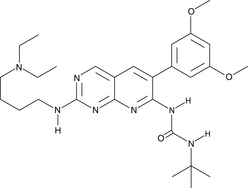Territorial Availability: Available through Bertin Technologies only in France
- Synonyms
- N-[2-[[4-(diethylamino)butyl]amino]-6-(3,5-dimethoxyphenyl)pyrido[2,3-d]pyrimidin-7-yl]-N’-(1,1-dimethylethyl)-urea
- Correlated keywords
- fibroblast growths factors receptors FGFRs FGFR1 tyrosine kinase activity activities activation signals propagation inhibitors inhibition inhibits autophosphorylation PDGFR c-Src cSrc c Src EGFR InsR MEK PKC FGFR2 FGFR3 FGFR4 FGFR5 angiogenesis cancers tumors self-renewal self renewal stems cells ERK1/2 ERK-1/2 ERK 1/2 PD173074
- Product Overview:
The fibroblast growth factor receptors (FGFRs) are cell surface receptors with intrinsic tyrosine kinase activity, which is necessary for receptor activation and signal propagation. PD 173074 is a potent and selective inhibitor of FGFR tyrosine kinase activity, blocking autophosphorylation of FGFR1 with an IC50 value of 21.5 nM.{17312} For comparison, it weakly inhibits PDGFR and c-Src (IC50 = 17.6 and 19.8 ?M, respectively) and has no effect on EGFR, InsR, MEK, or PKC.{17312} PD 173074 also prevents signaling, at nanomolar levels, through FGFR2-5.{17313,17314,17315,17316,17317} Inhibition of FGFR signaling using PD 173074, impairs angiogenesis as well as self-renewal of stem cells via ERK1/2 activation.{17313,17316,17317,17318,17319}
Cayman Chemical’s mission is to help make research possible by supplying scientists worldwide with the basic research tools necessary for advancing human and animal health. Our utmost commitment to healthcare researchers is to offer the highest quality products with an affordable pricing policy.
Our scientists are experts in the synthesis, purification, and characterization of biochemicals ranging from small drug-like heterocycles to complex biolipids, fatty acids, and many others. We are also highly skilled in all aspects of assay and antibody development, protein expression, crystallization, and structure determination.
Over the past thirty years, Cayman developed a deep knowledge base in lipid biochemistry, including research involving the arachidonic acid cascade, inositol phosphates, and cannabinoids. This knowledge enabled the production of reagents of exceptional quality for cancer, oxidative injury, epigenetics, neuroscience, inflammation, metabolism, and many additional lines of research.
Our organic and analytical chemists specialize in the rapid development of manufacturing processes and analytical methods to carry out clinical and commercial GMP-API production. Pre-clinical drug discovery efforts are currently underway in the areas of bone restoration and repair, muscular dystrophy, oncology, and inflammation. A separate group of Ph.D.-level scientists are dedicated to offering Hit-to-Lead Discovery and Profiling Services for epigenetic targets. Our knowledgeable chemists can be contracted to perform complete sample analysis for analytes measured by the majority of our assays. We also offer a wide range of analytical services using LC-MS/MS, HPLC, GC, and many other techniques.
Accreditations
ISO/IEC 17025:2005
ISO Guide 34:2009
Cayman is a leader in the field of emerging drugs of abuse, providing high-purity Schedule I-V Controlled Substances to federally-licensed laboratories and qualified academic research institutions for forensic analyses. We are certified by ACLASS Accreditation Services with dual accreditation to ISO/IEC 17025:2005 and ISO Guide 34:2009.





